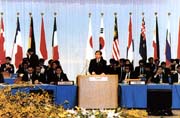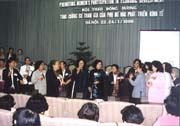Japan - ASEAN Cooperation
- A New Dimension in Cooperation -
Japan's economic cooperation to ASEAN nations has up to now primarily been undertaken on a bilateral basis. However, cooperation is now taking new form that transcends national borders.
Years of turmoil have come to an end, Vietnam, Cambodia, and Laos have achieved peace and are striving to develop market economies. These three countries, together with Thailand, Myanmar, and China's Yunan Province are today regarded as a single economic zone formed around the Mekong River. Presently, donor nations and international organizations are hard at work on comprehensive development of this vast geographic zone.
Amid such international movements, Japan has long been an active supporter of Cambodia. In January 1993, then Japanese Prime Minister Kiichi Miyazawa proposed the "Forum for Comprehensive Development of Indochina," prompting action toward holding a ministerial meeting that took place in Tokyo in February 1995. At present, working groups are taking follow-up action on this effort.
In addition, Japan has actively supported Vietnam's induction in the ASEAN, which finally was formalized in July 1995. It is also actively supporting efforts to bring in Cambodia, Laos into the ASEAN family.
Support for Mekong River Basin Development
Rising International Momentum for Wide-Area Development from regional perspective.
The Mekong River originates in Tibet and flows through Yunan Province of China, Myanmar, Thailand, Laos, Cambodia, Vietnam and into the South China Sea. It is the main artery for Indochina. The extensive area is blessed with natural and human resources and is spurring great expectations due to its huge potential for economic growth. However, all of these nations except Thailand are under centralized economies that have been ravaged by internal conflicts and suffered setbacks in terms of economic development.
Despite the unfortunate circumstances, peace in Indochina was restored with peace in Cambodia. Since the mid-1980's, the nations of Indochina have exerted their energies in economic recovery through a shift to market economies. International interest in development of the Mekong River region has grown in recent years, and a number of international initiatives have surfaced. Examples are the "Greater Mekong Sub-Region Economic Cooperation" sponsored by the Asia Development Bank held since 1992 and thereafter and the reinauguration of the Mekong River Commission in 1995.
For efficient and effective development of the Mekong River Basin, development must take the form of a comprehensive approach with attention to balanced development of the entire region, rather than through independent development pursued by each country. Of particular importance is development with attention paid to achieve regional balance, including development of road and railway infrastructure devastated by internal conflicts and preservation of the environment to ensure sustainable development.
Japan has also been active in supporting the region in other ways. For example, Japan hosted the "Ministerial Meeting of the Forum for Comprehensive Development of Indochina" in Tokyo in February 1995. In March 1996, the "Task Force for Strategies for Development of the Great Mekong Area" was formed by private sector specialists to present a comprehensive plan aimed primarily for infrastructural development for the Greater Mekong Area formed by nations of the Indochinese Peninsula. The task force published its report in August of the same year.
The following are principal international efforts and Japan's cooperation projects related to Mekong River Basin development.
Mekong River Commission Reinaugurated
The former Mekong River Committee, organized in 1957, functioned as a committee studying water resources development on the Mekong River and involving Thailand, Laos, Cambodia, and former South Vietnam.
However, since 1977 activities of the committee were almost totally frozen under the Cold War order. With its end, the Mekong River Commission was reinaugurated in April 1995. Members include Thailand, Vietnam, Cambodia, and Laos (with China and Myanmar on observer status), along with 16 cooperating nations such as Japan, Australia, Denmark, and Sweden, and a number of international organizations.
The new commission was formed to implement cooperation of all types for sustainable development, use, and management of water and water-related resources in the Mekong River area. The original aim of the commission expanded from development exclusively of water resources of the Mekong River to include related areas such as tourism along the river.
The Mekong River Commission is expected to contribute to development of the area as the only international development organization covering all of Indochina and acting with an approach from the regional perspective.
As a cooperating nation, Japan provides active and wide-ranging support in terms of human resources and funding, including a Japanese national who served as chief executive officer.
Forum for Comprehensive Development of Indochina Organized Under Japanese Initiative
Forum for Comprehensive Development of Indochina was first proposed as a gathering for debate and exchange of views on balanced development of Indochina by then Prime Minister Kiichi Miyazawa in January 1993 on his tour of ASEAN nations. The Forum's Ministerial Meeting was held in Tokyo in February 1995. Chaired by Japan, 25 nations including Vietnam, Cambodia, Laos, and 6 ASEAN nations, and 8 international organizations such as the European Committee assembled at the meeting.
The objectives were: (1) Development of whole of Indochina from the regional perspective; (2) international cooperation through voluntary coordination of assistances based on information exchange among participating nations and organizations; and (3) promotion of market economies in the three countries.
At the meeting, a compendium, in which Asia Development Bank (ADB) reported on the state of assistance and problems in infrastructure development and United Nations Development Plan (UNDP) covered human resources development, was submitted. Agreement was also reached on the formation of working groups on infrastructure development and human resources development. Japan was chosen to chair the infrastructure development group, and France to chair the human resources group. Furthermore, a private-sector advisory group was formed to reflect opinions of the private sector vital for economic development.
As follow-up to the Forum, a private-sector advisory group convened in Bangkok in March 1996, a working group on infrastructure development in Sydney in September, and a working group on human resources development in Bangkok in December.
 Then Foreign Minister Kono speaking at the ministerial meeting of Forum for Comprehensive Development of Indochina held in Tokyo |
Task Force for Strategies for Development of the Greater Mekong Area
As another effort to promote development of the greater Mekong River Basin, Japan formed the Task Force for Strategies for Development of the Greater Mekong Area, consisting of private-sector experts, in March 1996. The task force was organized to compile a fundamental approach for balanced development in the region comprising of the Indochina nations along the Mekong River. Its report was published in August 1996.
The report presented Japan's approach in support of harmonized and balanced development, based on (1) infrastructure development transcending political borders and regions; (2) priority support to Cambodia and Laos; and (3) emphasis on environmental issues in areas along the Mekong River Basin.
WID Seminar Held in Indochina
At the ministerial meeting of the Forum for Comprehensive Development of Indochina, it was agreed that attention should be paid to women's role in promoting development (WID) in developing nations. In response to Japan's announcement of the "WID Initiative" at the Fourth World Conference on Women held in Beijing in September 1995, the Indochina region WID seminar sponsored jointly by Japan, UNDP, and ESCAP was held in Hanoi in January 1996. There the status of women and problems involved in the three nations were identified. An action plan making recommendations on better skill training, better working conditions for women, greater access to credit and finance, and support of women entrepreneurs was adopted at the meeting.
Subsequently, workshops were held in Vietnam in May, in Laos in June, and in Cambodia in November. Various forms of cooperation catering to conditions in each nation were reviewed, including adoption of nation-based action plans. Japan is also making its contribution to Indochina in the area of women's issues. These include financial cooperation through UNDP funding, introduction of Japan's WID-related efforts at seminars and workshops in various nations, construction of child care centers, maternal care health centers, and elementary schools in various nations, and participation of experts in workshops, among others.
 Japan-supported Indochina Regional WID Seminar workshop in Vietnam |
A New ASEAN Initiative - Ministerial Meeting on ASEAN-Mekong River Basin Development Cooperation
At the Ministerial Meeting on ASEAN-Mekong River Basin Development Cooperation, the increasingly strong ASEAN nations are taking their own initiatives to promote development of the Mekong River Basin. Formation of this group was agreed on at the ASEAN Summit in December 1995. The first ministerial meeting on Mekong River Basin development was held in Kuala Lumpur in June 1996 and adopted the "Basic Framework for Development Cooperaiton in the Mekong River Basin," which places priority on infrastructure development, trade investment, agriculture, natural resources, support of small and medium-sized businesses, tourism, and human resources development.
Moreover, two working groups on the Mekong Development Fund and the Pan-Asia Railway Project were created.
International Cooperation Programs for Mekong River Basin Development
| Name | Description |
|---|---|
| Mekong River Commission | * Formulation and research of projects related to
water resources (including power generation,
transportation, and agriculture) * Established in 1957. Reinaugurated in April 1995 through signature of new agreement. Donor nations' meeting held in November 1995 (Ho Chi Minh City) * Membership consists of Vietnam, Thailand, Cambodia, and Laos. 16 donor nations including Japan, and international organizations are cooperating with MRC. * First phase of Mekong River Basin Development Plan (BDP) on definition of methodology has been completed. With definition of the second phase (establishment of priority development strategy, etc.), BDP task force will be formed within the secretariat. |
| ADB Greater Mekong Sub-Region Economic Cooperation | * Identification of assistance projects for the
Greater Mekong Sub-region by recipient nations * Meetings held regularly since 1992 under ADB's initiative * Membership consists of Cambodia, China (Yunan Province), Laos, Thailand, Vietnam, and Myanmar, along with international organizations and donor nations as observers. * The 6th ministerial meeting held in August 1996 in China (Kunming) * Different forums for 7 specific sectors (transportation, electric energy, communications, human resources, tourism, environmental protection, and trade investment) established and currently under discussion. |
| Forum for Comprehensive Development of Indochina | * Proposed by Japan in 1993. Debate and exchange of
views held on balanced development in all of Indochina * Ministerial Meeting held in Tokyo in February 1995, with participation of 25 nations and 8 international organizations * As follow-up to the Ministerial Meeting, private-sector advisory group was formed in March 1996. Infrastructure development working group met in September. (chair: Japan). Working group on human resources development met in December. |
| Working Group on Industrial Cooperation for Cambodia, Laos, Myanmar (CLM) | * Formed in September 1994. Debate on industrial
cooperation between Japan and ASEAN nations and Indochina
nations * Participants are representatives of the government and private sector of Japan, ASEAN nations, Cambodia, Laos, and Myanmar * Agreement reached on 7 sectors, such as market economy development and specialized market economy zones. Expert meetings on household appliances, automobiles, etc., held in succession. Policy based on findings at the experts' meeting proposed at the 5th meeting in August 1996 |
| Ministerial Meeting on ASEAN-Mekong Basin Development Cooperation | * Meeting for assistance to Cambodia, Laos, and
Myanmar. Agreement reached at the ASEAN Summit in
December 1995 * First ministerial meeting held in June 1996. Membership consists of 7 ASEAN nations, along with Mekong River nations (Cambodia, Laos, and Myanmar). Agreement reached on the basic framework for Mekong Basin development cooperation. Eight areas such as infrastructure development, trade investment, agriculture, and natural resources chosen as priority issues. * Two working groups on Mekong Development Fund and Pan-Asia Railway formed |
Back to Index

 The Mekong River Basin
The Mekong River Basin